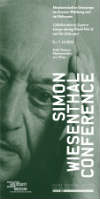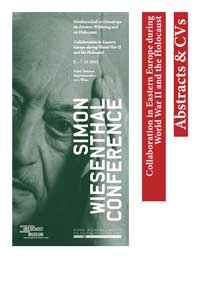Simon Wiesenthal Conferences
As it was still being established, the Vienna Wiesenthal Institute for Holocaust Studies (VWI) already organised two large international conferences: In June 2006, it held the conference “The Legacy of Simon Wiesenthal for Holocaust Studies” at the International Research Centre for Cultural Sciences (IFK) and in June 2007 the conference “Labour and Extermination” at the Wiener Arbeiterkammer (Vienna Chamber of Labour). In October 2011, the Simon Wiesenthal Conference series was continued with the topic “Scores of Commemoration: The Holocaust in Music” at the Vienna University for Music and Performing Arts.
Beginning in 2012, a three-day “Simon Wiesenthal Conference” has been held every year, in English and German. As with the Simon Wiesenthal Lecture series, the conference topics cover the entire range of topics in international Holocaust research, with a new focus each year. The topics are chosen in collaboration with the International Academic Advisory Board. The calls for papers are posted in the usual forums and are primarily aimed at attracting young, ambitious researchers from across the world. Established, internationally renowned scholars are invited to hold key note addresses or concluding and evaluating talks. Thus, the interested public in Vienna are given access to presentations and discussions of the most recent research insights.
The conference proceedings are published each year in a dedicated series of VWI publications, the so-called VWI-Beiträge zur Holocaustforschung, in English or in German.
| Simon Wiesenthal Conference | |||
| SWC 2013: Collaboration in Eastern Europe during World War II and the Holocaust / Mittäterschaft in Osteuropa im Zweiten Weltkrieg und im Holocaust | |||
from Thursday, 5. December 2013 - 10:00 Palais Trautson, Museumstraße 7, 1070 Wien-Neubau
|
|||
Behind the Iron Curtain, these conflicts proved to be even more entrenched: Civilian populations—some of which were also targets of the Nazis’ wider race war—had cruelly suffered under Nazi occupation. This shifted the focus of postwar memory even more toward the glorification of resistance, partisans, and underground fighters than further west, while a censured and Communist Party-controlled politics of the past concentrated above all on the antifascist myth over the murder of the Jews and Roma. The fall of Communism in 1989 did not make the interpretation of the recent past for either the societies or the historians of East Central and Eastern Europe any less fraught. Instead, they complicated the questions about the fascist period with which the democratic societies of Western Europe had already begun to grapple, if late and hesitantly. In the East, the question of collaboration with both Nazism and Communism was simultaneously scrutinized and recast. Against the backdrop of the uneven and controversial Western European experiences, the 2013 Simon Wiesenthal Conference—co-organized by the Vienna Wiesenthal Institute for Holocaust Studies and United States Holocaust Memorial Museum’s Center for Advanced Holocaust Studies — takes stock of the recent research on complicity and collaboration in the Nazi-occupied and Axis-aligned countries Eastern Europe. The conference will be conducted in English and German. OrganizersCenter for Advanced Holocaust Studies, United States Holocaust Memorial Museum Vienna Wiesenthal Institute for Holocaust Studies (VWI)
___________________________________________________________________________________________
Allein jenseits des Eisernen Vorhangs gestaltete sich diese Auseinandersetzung noch schwieriger: Zivilbevölkerungen – zum Teil auch Opfer jenes rassistisch motivierten Vernichtungskrieges, der sich in erster Linie gegen die jüdische Bevölkerung richtete – hatten ja hier unter den NS-Besatzungsregimen unvergleichlich mehr zu leiden gehabt als jener in West- und Nordeuropa. Dies rückte nach 1945 zum einen die Erinnerung an den Widerstand, an die Partisanen und Untergrundkämpfer noch mehr als im Westen des Kontinents in den Fokus, zum anderen verhinderte aber eine zensurierte und von den KP-Regimen gesteuerte Geschichtspolitik gezielt jede über den antifaschistischen Mythos hinausgehende Auseinandersetzung mit der Ermordung der Juden, Roma und Sinti. Auch die Wende um 1990 erleichterte weder den Gesellschaften noch den Historikern Ost- und Ostmitteleuropas eine Klärung der unmittelbaren Vergangenheit, waren sie doch mit jenen Fragen, denen sich die demokratischen Gesellschaften Westeuropas schon spät und zögerlich gestellt hatten, gleich doppelt konfrontiert. In Osteuropa mussten die Narrative bezüglich der faschistischen Periode, aber auch Kommunismus (sowie die Frage der Kollaboration mit beiden Systemen) zeitgleich überprüft und umgeschrieben werden. Die gemeinsam vom Wiener Wiesenthal Institut für Holocaust Studien (VWI) und vom Center for Advanced Holocaust Studies des United States Holocaust Memorial Museum organisierte Simon Wiesenthal Conference 2013 versucht nun, eine Bilanz der neueren Forschungen zu Komplizenschaft und Kollaboration im NS-besetzten und mit NS-Deutschland verbündeten Osteuropa zu ziehen – vor dem Hintergrund der westeuropäischen, durchaus widersprüchlichen und kontroversen Erfahrungen. Konferenzsprachen sind Englisch und Deutsch VeranstalterCenter for Advanced Holocaust Studies, United States Holocaust Memorial Museum Wiener Wiesenthal Institut für Holocaust-Studien (VWI)
Watch the Conference on our YouTube Channel:
Tagungsbericht auf H-Soz-u-Kult Eröffnungsrede von Justizministerin Dr. Beatrix Karl
|
|||













